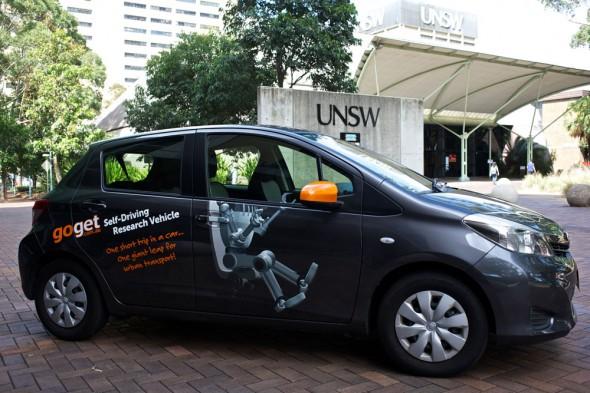GoGet sees driverless cars and tighter integration with trains and buses as the future of its car-sharing service in Australia, according to co-founder Bruce Jeffreys.
GoGet has more than 1100 vehicles in Sydney and 200 in Melbourne. It has nearly 50,000 customers subscribed to the service.
“When we started, it was very much a stand-alone service in which it took a while for people to get their heads around the concept and make the leap,” Jeffreys said in an interview with Computerworld Australia.
“The big change is that we’re now really in the integration stage, where the service is bolting into existing infrastructure.”
GoGet recently partnered with Ikea to get vans into the furniture store’s parking lots for Ikea customers who don’t have cars. Ikea came to GoGet with the idea, in which Ikea customers can sign up for the cars in the store, use them to transport their furniture and then bring them back to the store when they’re done.
GoGet is also bringing its cars into residential developments and hopes to integrate with public transportation systems in the future, said Jeffreys.
The latter could bring GoGet cars to train stations and allow users to pay for their car-sharing membership and public transportation under a single ticket, he said.
In addition, Jeffreys wants to open its data to developers. “One of the things we’ve done a lot of work on just recently is make a public API for our backend booking platform,” he said.
This could allow a public transportation trip planning app to include GoGet car locations when it calculates the best route, for example.
Look – no hands!
The next big thing for GoGet could well be self-driving cars – regulations permitting.
GoGet in February announced a project with the University of New South Wales to research driverless cars.
“Our motivation for starting the business was to get rid of excess cars on the road,” explained Jeffreys. “Driverless cars are a massive disruption to how vehicles are used that would achieve that aim much faster.”
“There’s a business case for driverless cars that matches our business very tightly.”

Read more: Australian-developed vehicle accident prevention technology to hit world stage
Jeffreys believes GoGet customers are perfect for testing autonomous vehicles since they tend to be early adopters of technology.
Initially, cars will likely be merely semi-autonomous, where people control vehicles in cities but perhaps turn on the autopilot for highways, he said. Customers would still pick up cars at designated locations, not the other way around.
This will eventually change, he said. “Once the regulatory, safety and performance aspects are sorted out, the car would come to them.”
Regulation remains a roadblock to driverless cars and is the reason GoGet can’t roll out autonomous vehicles today. However, Jeffreys noted there has been progress, with three US states legalising autonomous vehicles and the European Union allowing trials on EU roads.
Read more: Startup snapshot: Drivelist
Australia could be an early adopter for autonomous vehicles if it makes the right moves, he said.
“Australia actually has an opportunity to lead in this area because we actually have compared to other countries quite a good insurance and road compliance framework.”
The fact that Australia is a large island with long, quiet highways makes it a “perfect country to trial this stuff,” he added.
Fighting car ownership
Even with the rise of Uber and other hired car and taxi booking apps, Jeffreys said GoGet’s biggest competition continues to be the private car.
“The privately owned car is still incredibly protected, looked after and subsidised,” he said. “Governments continue to provide or build massive amounts of parking for the private car that no other mode of transport gets.”
He questioned why so many parking spaces are built into new residential housing. Residents are not given a choice whether they want a space, and having one makes them feel obligated to own a private car, he said.
Read more: Driverless cars to be tested on South Australian roads
Meanwhile, car manufacturers spend hundreds of millions of dollars on marketing each year, he said. “If you took 10 per cent of that and spent it on public transport, things would be very different.”
In that light, Uber is actually a complementary service to GoGet, he said. “There’s huge scope for all these technology platforms to organise travel how they want to do travel.”
Jeffreys is less keen on peer-to-peer car-sharing models like Car Next Door, in which customers borrow their neighbours’ private cars. “It’s a business model that keeps people owning cars.”
Adam Bender covers telco and enterprise tech issues for Computerworld and is the author of dystopian sci-fi novels We, The Watched and Divided We Fall. Follow him on Twitter: @WatchAdam
Follow Computerworld Australia on Twitter: @ComputerworldAU, or take part in the Computerworld conversation on LinkedIn: Computerworld Australia

